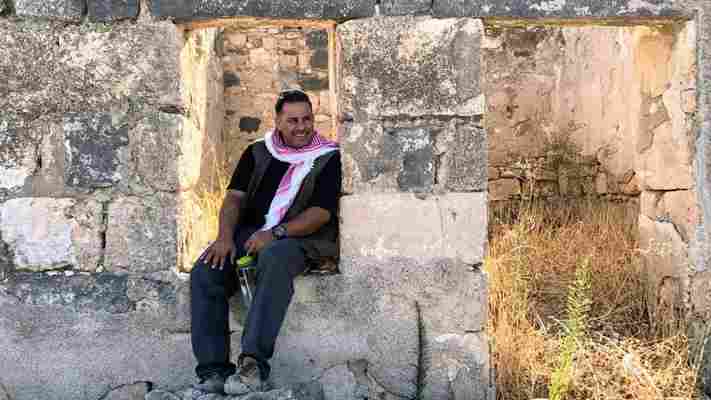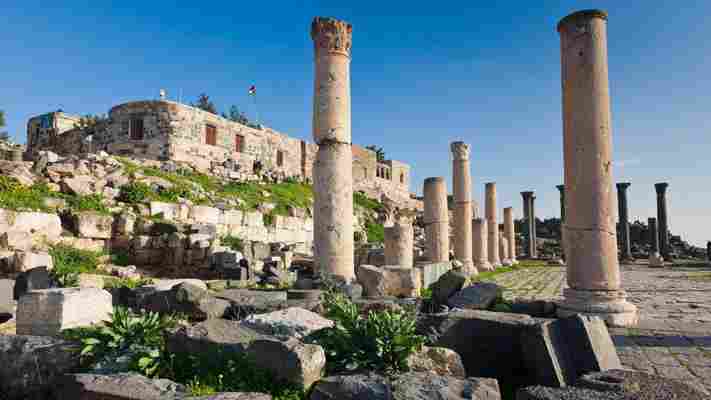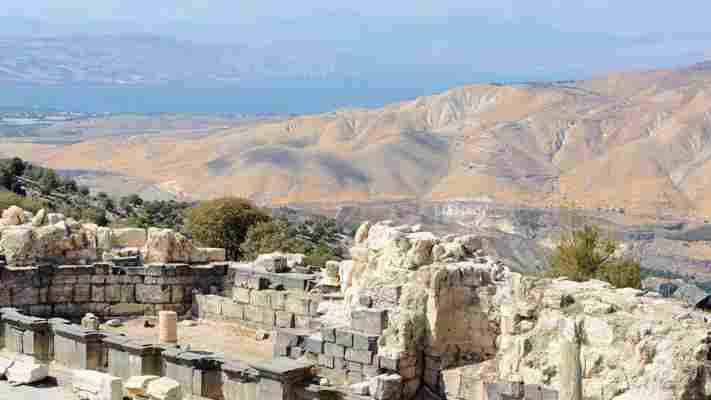Article continues below
“Here is my house,” Ahmad Alomari announced. Preoccupied with navigating the rubble underfoot, I almost missed his declaration entirely. I glanced up at the roofless black basalt and white limestone structure in front of us.
This is my home
“Wait, here?” I asked in disbelief. A golden glow from the early morning sun shone through the door and window frames, illuminating the weed-covered interior. I assumed from Alomari’s jovial nature that he was joking. After all, we were standing inside the ancient ruins of Gadara in the north-western corner of Jordan. And, unless Alomari is a spectre, he certainly wasn’t around in 63BC when the city became an important part of the infamous Greco-Roman Decapolis , a powerful network of 10 cities formed after the Roman conquest of Ancient Palestine.
“Yes, here ,” he repeated, his smile stretching wide across his face. “This is my home.”

Ahmad Alomari grew up in a home made from the stones of Roman ruins (Credit: Sunny Fitzgerald)
You may also be interested in: • A silent city hidden in the desert • The ancient path through the Palestinian territories • The man saved by a tin of fish
Lonely columns that once supported three open-air theatres, a basilica and a temple dotted the hilltop. From Alomari’s home, I took in the dramatic view of the Sea of Galilee and Israel. A little further east, Syria’s south-western corner spread out before me.
Forty-five years ago, Alomari was born in this very place – a humble house built from ancient stones left behind by Roman-era inhabitants.
But the site of Alomari’s childhood home has a history dating back to the 7th Century BC; the Ptolemies and then the Seleucids occupied the city before the Romans arrived in the 1st Century BC. Strategically positioned along trade routes, Gadara enjoyed a golden age of economic and cultural growth, with artists and scholars flocking to the city. But after several centuries, Gadara’s popularity and influence began to decline. Changes in trade routes and a series of earthquakes that destroyed the city’s infrastructure in the 8th Century likely contributed to Gadara’s ultimate abandonment. What was left of the Roman-era structures lay empty for a millennium.

Gadara is awaiting consideration for Unesco World Heritage status (Credit: Hemis/Alamy)
In the late 19th Century, new life came to the ancient acropolis. “At that time, the people here were nomadic, pastoral and farmers,” Alomari explained. When one group – including some of Alomari’s ancestors – discovered the skeleton of the former hilltop city, complete with water wells and building materials, and in close proximity to farmable land and the Yarmouk River, they decided to put down roots. Alomari’s great-grandfather was likely one of the first people to take up residence in the ruins and help build a new village on the foundation of the ancient city.
“These are 2,000 years old,” Alomari said, running his hand along the rocks that form the walls of his former home. “But my father built this house less than 100 years ago.”
In the 1960s, Jordan’s Department of Antiquities declared Gadara an archaeological site; it’s now awaiting consideration for Unesco World Heritage status. Stoves and other elements not considered to be of cultural and historic value were removed, and the homes built by Alomari’s community fell into disrepair. “The Department of Antiquities forbade us from doing maintenance on our homes,” he said.
“The first excavation I saw was in the late 1970s,” Alomari recalled. Shortly thereafter, Gadara’s 1,500 residents were told to relocate.

In 63BC, Gadara became a part of the powerful Greco-Roman Decapolis (Credit: Frédéric Soltan/Getty Images)
Some families moved out almost immediately, purchasing modern homes in nearby Jordanian cities like Um Qais. “Life wasn’t easy in the village,” Alomari explained. “We had to bring water from the well, wash clothes by hand. It was dusty. There were snakes and scorpions. And we only had electricity for a few hours each evening, provided by a generator.”
But even as a child, Alomari recognised that the heart of a place is its people. “Without the families, the village became a body without a soul.”
Without the families, the village became a body without a soul
Growing up in the archaeological site, Alomari loved sharing village life with visitors; Gadara has long been a site of Christian pilgrimage, with many believing it to be the place where Jesus Christ cast the demons from two men into a drove of pigs. Alomari’s interactions with foreigners remain some of his first and favourite memories.
“When we lived here, travellers visiting Gadara would come to our house,” he said. “They’d sit here on our terrace, drink tea and eat with us.”
From its hilltop location, Gadara overlooks Israel, the Palestinian territories and Syria (Credit: Sunny Fitzgerald)
He stood up from the stone window sill and I followed, stepping down over the derelict rectangular stones piled in front of his former home. “The first time I spoke to a tourist, I was about eight years old,” he recalled. “It was in here,” he said as we approached the entrance to the restored Roman theatre on the western side of the site. “My friends and I also played hide-and-seek here,” he added, his voice bouncing off the curved basalt seats surrounding us.
We continued our walk through the ancient city, making our way past the abandoned trader stalls along the paved Roman road, and up the hill towards the cluster of free-standing columns that mark where the basilica once stood. “We used to play football here,” Alomari said. “These were our goal posts.” On this day, there were no children running or playing; in fact, there wasn’t another person in sight.
“And that,” he added, glancing at an upper terrace dotted with modern tables and chairs, “is a restaurant now. But it used to be my school.” Alomari’s voice dropped and I detected a distinct sadness.
“When my family moved to the new house in Um Qais in 1987, I refused to leave my village,” Alomari said. He was just 14 years old at that time. “I stayed three days by myself. I slept in a tent on our roof in the old village, with just my donkey and bicycle below.”
Gadara has long been a site of Christian pilgrimage (Credit: Hemis/Alamy)
A few years after his family relocated, Alomari heard the archaeologists were seeking English-speaking assistants to help with excavations. Although his language skills were extremely limited, his determination was boundless. “They called me in and asked if I could speak English. I knew if I said no, they wouldn’t give me the job.” So he stretched the truth and they hired him. Although he struggled to communicate, Alomari devoted his time to assisting with the excavations and improving his English over the course of the six-week assignment.
His hard work paid off: he was offered a job as a live-in guard in the small antiquities museum located inside the archaeological site. “I didn’t even ask about a contract or payment,” Alomari said. “The only thing I cared about was that I could finally live in my village again.”
The only thing I cared about was that I could finally live in my village again
He made the most of the opportunity – working with archaeologists and interacting with tourists by day, and studying everything from English to archaeology by night. “I was in the museum alone at night, so I read everything I could,” he said. “My first salary was about 100 dinars. And I used a quarter of it to buy my first Arabic-English dictionary.”
That dictionary came in handy in his conversations with colleagues, tourists and even a special someone. “I fell in love with a German girl who visited Um Qais,” Alomari confessed. The two spent much of her holiday together, communicating in English as neither could speak the other’s native tongue. “When she returned home, I wrote her a letter in English – only about 10 lines that took me three or four hours to write!” When she replied with her own 14-page letter, he had to pull out his dictionary and his romantic side. “I started to read and write poetry,” Alomari said, smiling.
Alomari continues to assist the Department of Antiquities in their preservation efforts (Credit: Sunny Fitzgerald)
Although the young lovers never met again, Alomari found happiness living and working at Gadara. While he no longer lives within the archaeological site, he continues to assist the Department of Antiquities in its preservation efforts and guide visitors around the ruins. But the absence of life at his old village still haunts him.
Alomari’s dream is for the former villagers to once again inhabit their homes inside the site, but he knows this is not possible. So he’s found the next best option: partnering with community-based tourism initiatives like Baraka Destinations and The Jordan Trail to facilitate engaging experiences such as homestays and cooking workshops. Alomari also hopes to one day host his own guests at a countryside homestay he is developing.
Without the people and the stories, Gadara is simply stones
“I already have the name,” he said, his smile wide once again. “It will be called, ‘Philodemos’.” Philodemus was a 1st Century BC philosopher and poet of Gadara – not entirely unlike Alomari himself.
“And do you know what his name means?” Alomari asked. “ Philos is ‘friend’ or ‘lover’, and demos is ‘the people’.”
“Friend... of the people,” I said aloud. As Alomari described his vision of welcoming visitors into his countryside home to share stories and break bread, I couldn’t help but nod enthusiastically. Without the people and the stories, the archaeological site – stunning as it may be – is simply stones.
Join more than three million BBC Travel fans by liking us on Facebook , or follow us on Twitter and Instagram .
If you liked this story, sign up for the weekly bbc.com features newsletter called "If You Only Read 6 Things This Week". A handpicked selection of stories from BBC Future, Earth, Culture, Capital and Travel, delivered to your inbox every Friday.

Leave a Reply